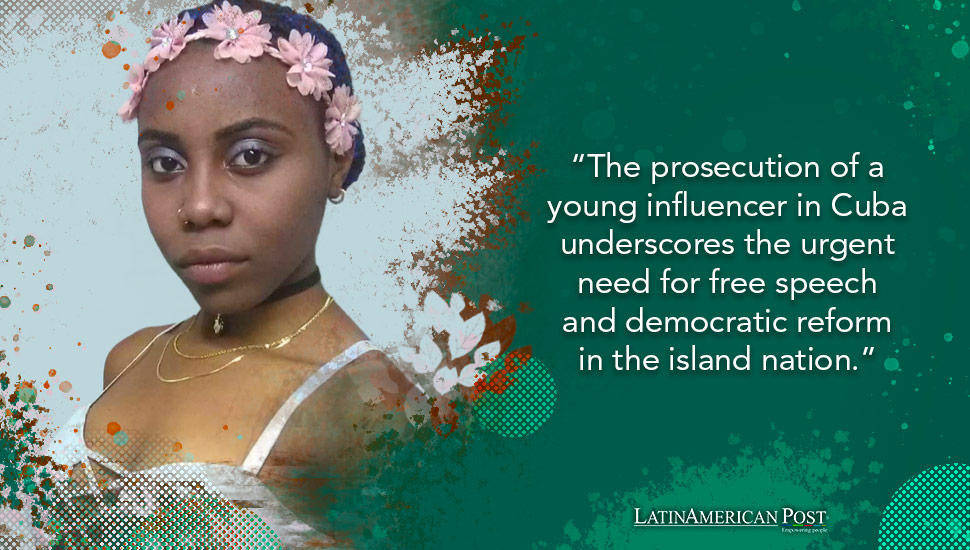Cuba’s New Influencer Case Highlights Urgent Need for Free Speech

The prosecution of a young influencer in Cuba underscores the urgent need for free speech and democratic reform in the island nation. As the government clamps down on dissent, it is time for change and a renewed commitment to human rights.
The recent case of Sulmira Martínez, a 22-year-old Cuban influencer facing a ten-year prison sentence for her critical comments about the government, starkly highlights the dire state of free speech in Cuba. Charged with contempt and crimes against constitutional order, Martínez’s ordeal reflects the broader struggle for democratic freedoms on the island. This case is not just about one individual but about the fundamental right to free expression and the urgent need for change in Cuba.
Sulmira Martínez’s case is emblematic of the Cuban government’s oppressive stance towards dissent. Accused of maintaining contacts with foreign dissidents, attempting to organize a protest, and posting critical comments on social media, Martínez has spent fifteen months in provisional detention. She has been held at Villa Marista State Security Detention Center and the Western Women’s Prison during this time.
According to the prosecution, Martínez’s critical activities began in late 2021 and early 2022. She allegedly created two anonymous Facebook profiles to voice her discontent, writing posts such as “With the dictatorship, there is no dialogue. Hit them as they hit you,” “It’s time to rise against those who starve our children,” and “To the streets until victory. Homeland and life.” She also criticized Cuban President Miguel Díaz-Canel multiple times.
Furthermore, Martínez is accused of using WhatsApp to advocate for planning another protest akin to the massive anti-government demonstrations on July 11, 2021. While these plans did not materialize, the intent alone has been enough to prompt severe charges.
A History of Repression
Cuba’s government has a long history of suppressing free speech and dissent. This repression has deep roots in the island’s history, particularly following the Cuban Revolution in 1959. The revolution initially promised a more just society, but over time, it devolved into an authoritarian regime under Fidel Castro. The government systematically curtailed freedoms, including the press and political opposition, to maintain control.
The 2019 Constitution of Cuba ostensibly guarantees freedom of expression. However, the reality is starkly different. The government frequently targets individuals who criticize the regime, using laws against “contempt” and “crimes against constitutional order” as tools to silence opposition. International human rights organizations and NGOs have repeatedly condemned Cuba for its harsh treatment of dissidents, journalists, and activists.
The 11J Protests: A Turning Point
July 11, 2021, marked a significant moment in Cuba’s history. Thousands of Cubans took to the streets to protest against the government, driven by economic hardship, shortages of food and medicine, and long-standing political repression. The scale of these protests was unprecedented, revealing widespread discontent among ordinary Cubans.
The government’s response was swift and brutal. Security forces arrested hundreds of protesters, and reports of violence and mistreatment were widespread. Despite this, the protests ignited a renewed spirit of resistance and highlighted the urgent need for political and social reforms.
Social media has become a crucial platform for dissent in Cuba, allowing individuals to share information, organize protests, and express their views. However, the government closely monitors these platforms and often uses them to track and arrest dissidents. The case of Sulmira Martínez illustrates this dynamic. Government authorities closely watched her social media activities, including her involvement in online groups and critical posts.
While social media offers a vital outlet for free expression, it poses significant risks for users in repressive environments. The Cuban government’s actions against Martínez and others demonstrate the lengths to which it will go to stifle dissent.
The Call for Change
The persecution of individuals like Sulmira Martínez underscores the urgent need for change in Cuba. The government’s oppressive tactics are not sustainable in the long term. For Cuba to move forward, it must embrace democratic reforms and respect human rights, including the right to free speech.
Change is necessary for individual freedoms and the country’s development. A society that silences its citizens cannot thrive. Allowing free expression and open dialogue is crucial for addressing Cuba’s myriad challenges, from economic hardship to social inequality.
Cuba’s struggle for democracy and free speech is part of a broader regional context. Latin America has a complex history of authoritarianism and democratization. Countries like Argentina, Chile, and Brazil have transitioned from dictatorships to democracies, demonstrating that change is possible. These nations have faced challenges ensuring freedom of expression and human rights but have made significant strides.
Cuba can learn from these experiences. The transition to a more open and democratic society requires political will, civil society engagement, international support, and a commitment to justice and reconciliation.
International Support
The international community can support Cuba’s transition to democracy. Organizations such as the United Nations and the Organization of American States (OAS) should continue to pressure the Cuban government to uphold human rights standards. Additionally, countries with diplomatic relations with Cuba can use their influence to advocate for change.
At the same time, international support must be balanced with respect for Cuba’s sovereignty. The goal should be to empower Cuban civil society and support grassroots movements pushing for reform.
The case of Sulmira Martínez is a stark reminder of Cuba’s repressive environment and the urgent need for change. Free speech is a fundamental human right that should be protected and celebrated, not punished. For Cuba to progress, it must embrace democratic reforms and ensure its citizens can express themselves without fear of persecution.
Also read: U.S. Condemns Cuba’s Protest Sentences Amid Own Crackdowns
The time for change is now. By advocating for free speech and supporting democratic movements, Cuba can move towards a brighter, more inclusive future. The international community and the Cuban people must work together to make this vision a reality. The voices of dissent are not just cries for freedom; they are calls for a better, more just society. It is time for Cuba to listen and respond with the dignity and respect all its citizens deserve.





